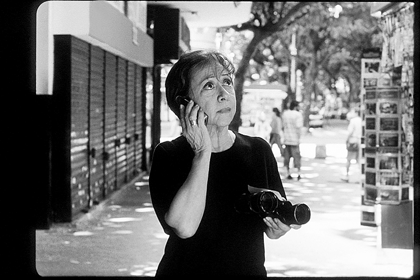Fernanda Montenegro stars in Brazilian drama about a sexual awakening
An elegant, intriguing Brazilian film, “The Other Side of the Street” provides another engaging role for Fernanda Montenegro, the extraordinary 60-something actress best known for her Oscar-nominated performance in “Central Station.”
As Regina, a valued member of the “senior service”—an unpaid police informant squad—Montenegro watches out for crimes in her upscale Copacabana neighborhood. Early on, Regina shows her steeliness, donning leather pants to enter a swanky nightclub to identify the boss of a child prostitution ring.
While Regina gets satisfaction out of her volunteer work, it is mainly an excuse to keep busy when she is not spoiling her grandson. Regina is estranged from her own son, because he lives with her ex-husband. As such, she is mostly lonely, and “The Other Side of the Street” makes her loneliness palpable. Director Marcos Bernstein spies on his protagonist with the same intensity and poignancy as Regina spies on her neighbors with her binoculars. And just like Jimmy Stewart in Alfred Hitchcock’s “Rear Window,” one night Regina insists that she has witnessed a murder.
The suspect is Carmago (Raul Cortez), a judge, and the victim is his wife. However, when Regina calls her police contact to investigate, trouble ensues and she is soon suspended from the service. Regina slowly comes to realize that she is simply picking up the abandoned shit other people discard—as when her efforts to apprehend a gun-toting robber go unappreciated.
Because Regina knows what she saw the night of the murder, she is sure Carmago is guilty, and sets off to pursue him on her own. She eventually begins “dating” her prey, and “The Other Side of the Street” builds tension as Regina lies to Carmago in an effort to gain his trust, and force him to reveal his crime.
Curiously, though, Bernstein soon takes his film in a different direction, and allows the two elderly people to find solace in each other. Through their unlikely courtship, the two discover they have estranged children, had unhappy marriages and are lonely. The mystery soon makes way for an unlikely, but interesting romance.
“The Other Side of the Street” may be a new spin on the formulaic story of an investigator becoming attached to the target, but the novel thing Bernstein does with this storyline is to make the hero an older woman. Once the “whodunit” murder mystery is placed on the back burner—and eventually resolved in a rather predictable fashion—all that remains is the relationship that develops between Regina and Carmago. While these scenes of tenderness compensate for the dramatic shift in tone, the film is certainly less compelling during its second half. Even the few loose ends tied up in the finale feel tacked on for good measure.
It is a shame that “The Other Side of the Street” fails to sustain its tension once the film crosses over from thriller to romance; the drama goes from suspenseful to sappy.
Bernstein enjoys exploring Regina’s heartfelt awakening, and Montenegro clearly relishes acting tough, playing up her character’s vulnerability, particularly in the scene when she sleeps with Carmago. Montenegro’s co-star, Raul Cortez, makes a perfect foil as the aloof Carmago. The power struggle between them comes to a head when Regina reveals part of herself to Carmago in a gay nightclub, and he calls her on her ironic sense of humor.
The scene underscores the impulsive nature of their relationship, and Regina’s unwillingness to let go of her cautious instinct to keep Carmago off guard. If only “The Other Side of the Street” kept viewers as beguiled for as long.
gaycitynews.com



































